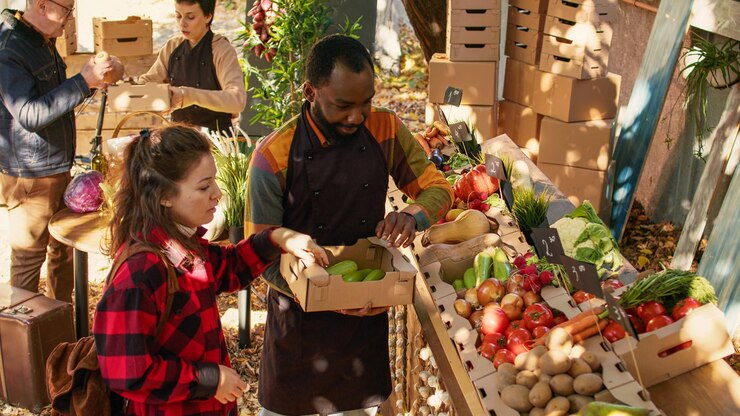A farmers market is a marketplace where local farmers and producers sell their fresh agricultural products directly to consumers. These markets typically feature a variety of items such as fruits, vegetables, dairy products, meat, artisanal baked goods, flowers, and sometimes handmade craft.
Are there really Farmers Market in Nigeria?
Yes, there are farmers markets in Nigeria. These markets serve as important platforms for farmers to sell fresh produce directly to consumers, which helps reduce the cost and increase access to fresh, locally grown food. Farmers’ markets in Nigeria are often held in urban and semi-urban areas, providing opportunities for small-scale farmers to showcase their products, such as fruits, vegetables, grains, and livestock. They also promote sustainable agriculture and support local economies. Some notable farmers’ markets are in cities like Lagos, Abuja, and Port Harcourt, where there’s increasing interest in organic and farm to table dining.
Farmers markets play a vital role in bolstering local economies and promoting sustainable practices. These vibrant community hubs serve as a direct link between farmers and consumers, fostering economic resilience by keeping financial benefits within the community. When shoppers purchase fresh produce, crafts, and other goods at farmers markets, a significant portion of the money circulates locally, supporting farmers, vendors, and small businesses. This cycle of local spending helps strengthen the economic fabric of the community, often resulting in increased employment opportunities and a boost to local tax revenues.

Beyond economic benefits, farmers markets are instrumental in encouraging sustainable agricultural practices. Many vendors prioritize organic farming, reduced use of chemical inputs, crop diversity, and soil conservation methods. The proximity of vendors to consumers reduces transportation emissions, a crucial aspect of sustainability, and minimizes the environmental footprint associated with food distribution. Moreover, farmers markets often foster transparency and educate consumers about the origins of their food, promoting awareness and appreciation for environmentally responsible farming.
In addition to environmental advantages, farmers markets contribute to social sustainability by strengthening community ties. They create a space where residents can connect with producers, learn about food production, and participate in local culture. This interaction enhances community cohesion and raises awareness about sustainable living. The emphasis on seasonal and locally grown produce also encourages dietary diversity and healthier eating habits, benefiting public health.
Farmers markets are more than just venues for buying and selling goods; they are catalysts for economic vitality, environmental sustainability, and social well-being. By supporting local farmers and embracing sustainable practices, these markets help create resilient communities capable of thriving in an increasingly interconnected and environmentally conscious world.
Leave a Reply